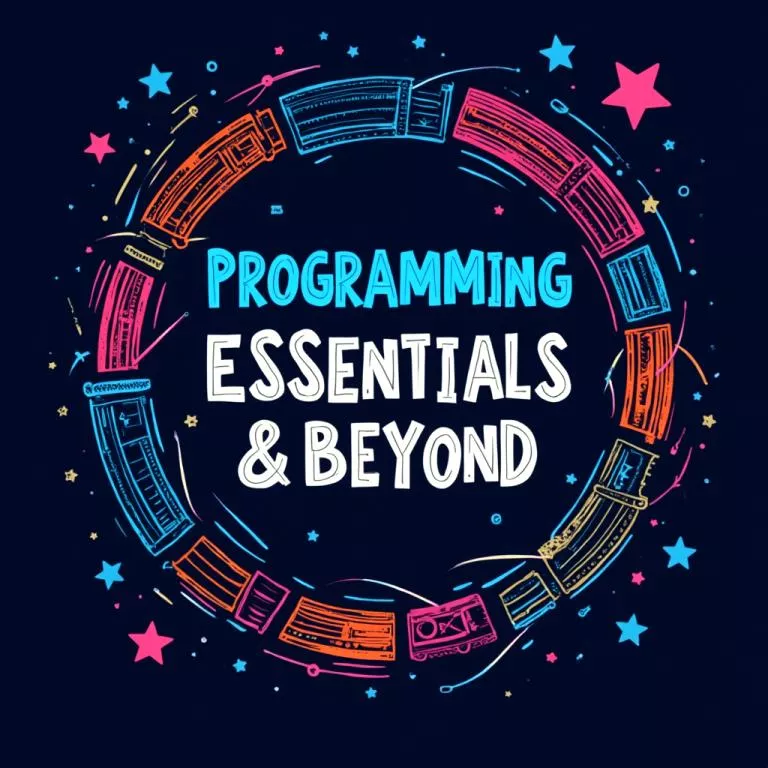Whether you're looking to start a career in tech, build your own applications, or simply gain an understanding of how software shapes the world , learning to program is an invaluable step. This guide, “Programming Essentials & Beyond,” will walk you through the fundamentals of programming, explore common languages and tools, and share insights on how to continually grow your skills as a developer.

Part 1: The Essentials of Programming
1. Understanding the Basics
Programming begins with understanding how to communicate with a computer. This involves learning:
- Syntax: Each language has its own set of rules and structure. Syntax errors can prevent code from executing, so mastering the basics is crucial.
- Data Types: Variables, numbers, strings, and other data structures form the core of programming logic.
- Control Structures: Loops, conditionals, and functions allow developers to control the flow of code and solve complex problems.
2. Picking Your First Language
Choosing a first programming language can be challenging, but here are a few popular choices for beginners:
- Python: Known for its simplicity and versatility, Python is great for beginners and is used in data science, web development, and AI.
- JavaScript: Vital for web development, JavaScript powers dynamic content on websites.
- Java: A more rigid language often used in Android development and enterprise-level software.
Each language has its strengths, and understanding the unique capabilities of each will help you decide which is right for you.
3. Working with Development Tools
To bring your ideas to life, you need the right tools:
- Integrated Development Environments (IDEs) like VS Code or PyCharm make coding easier with features like syntax highlighting and debugging.
- Version Control Systems like Git help manage changes, track code history, and collaborate on projects.
- Package Managers like npm (for JavaScript) and pip (for Python) simplify installing and managing libraries and frameworks.
Part 2: Moving Beyond the Basics
1. Exploring Data Structures and Algorithms
Data structures (like arrays, lists, and hash tables) and algorithms (such as sorting and searching) help developers solve problems efficiently. Mastering these concepts enables you to optimize code performance and work on complex systems.
2. Understanding Object-Oriented Programming (OOP)
OOP is a paradigm centered around “objects” and “classes” that helps organize code into modular, reusable components. Key concepts of OOP include:
- Encapsulation: Bundling data and methods that operate on the data.
- Inheritance: Creating new classes based on existing ones.
- Polymorphism: Allowing objects to be treated as instances of their parent class.
These concepts are especially useful for large projects, where code organization is key.
3. Learning About Databases and SQL
For applications that store and manage data, databases are essential. Learning SQL, the language for querying databases, is a critical skill for any programmer. You might work with:
- Relational Databases (like MySQL and PostgreSQL), which store data in tables with relationships.
- NoSQL Databases (such as MongoDB), which are more flexible for handling unstructured data.
Part 3: Best Practices for Continuous Improvement
1. Embrace Testing and Debugging
Writing and running tests ensure that code performs as expected and prevents bugs. Using frameworks like JUnit (for Java) or Pytest (for Python) is helpful for running automated tests, while debugging tools help identify and fix issues.
2. Explore Real-World Projects
Building projects beyond simple exercises solidifies your knowledge and demonstrates your skills. Consider:
- Web Development: Create a personal website or blog to showcase your portfolio.
- Data Science: Experiment with data analysis or machine learning projects.
- Mobile Apps: Build apps for Android or iOS, starting with simple calculators or to-do lists.
3. Join Communities and Contribute
Programming communities like GitHub , Stack Overflow, and Reddit are invaluable for support, networking, and learning. Contributing to open-source projects also offers hands-on experience, feedback, and an opportunity to give back to the tech community.
Conclusion
“Programming Essentials & Beyond” offers a roadmap from foundational concepts to advanced techniques. With persistence, a willingness to experiment, and continuous learning, anyone can master programming and open up endless opportunities in tech. Whether you’re building your first website or architecting complex systems, these essentials and beyond will set you up for success in your coding journey.
